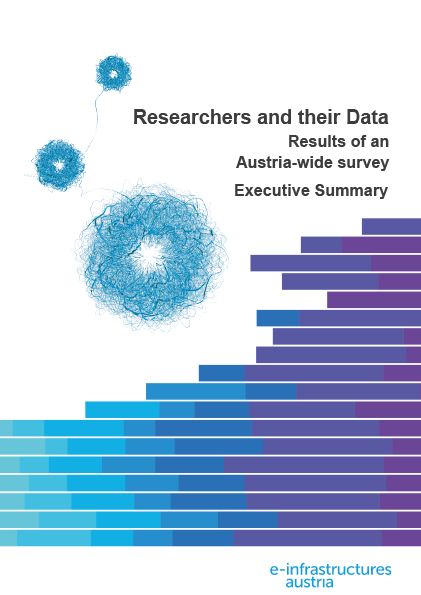Austria: New report “Researchers and their Data” published
Posted: December 1st, 2015 | Author: Sven | Filed under: German, Projects, Report, Research Data | Tags: Austria, infrastructure | Comments Off on Austria: New report “Researchers and their Data” published A solid research data management system is the foundation of cooperative, open research. In addition such a system fosters reproducibility and verifiability of research.
A solid research data management system is the foundation of cooperative, open research. In addition such a system fosters reproducibility and verifiability of research.
This topic is relevant and up-to-date for researchers, funding bodies and senior posts of scientific institutions, which is currently also underpinned by the pilot for research data of the European Commission.
In this context, the project e-Infrastructures Austria has just released a report that provides an overview of an Austria-wide survey on research data. The survey was carried out at the beginning of 2015. It was directed at the scientific and artistic-scientific personnel of all 21 public universities and three extramural research institutions in Austria.
The project received 3026 completed questionnaires, which is equivalent to an average response rate of 9 %.
The participants were asked about the following topics:
- Data types and formats
- Data archiving, backup and loss
- Ethical and legal aspects
- Accessibility and subsequent use
- Infrastructure and services
The results of the study confirm the current expectations with respect to the handling of research data. For each thematic area, both cross-curricular commonalities as well as discipline-specific features were determined (where relevant).
For data types and formats, the expectations are fully met: From the majority of researchers, research data are generated in the form of unstructured text files,
graphics and tables. One quarter of the participants use structured text, one quarter videos, data bases and source code, and a fifth use audio and software.
With regard to data archiving and backup, the results of other studies confirm the outcome of many other surveys: Most researchers prefer to store their data on business and private computers as well as on external hard drives and USB drives. Obviously not a good solution. This common practice also might explain why almost a third of the respondents already experienced data losses.
On the topic ethical and legal aspects, one-third of the researchers claimed to have never or rarely been confronted with legal ambiguities in foreign data usage, but one fifth experienced legal uncertainties at least sometimes. Sensitive data is used by every seventh researcher. Playing a major role here is (unsurprisingly) medical science.
To me, especially the results in the field of accessibility and subsequent use were of special interest. When the respondents were asked “who has access to self-compiled research data?”, the majority stated, that their data is available on request only (57%), or available for selected persons (53%) within an institution. In sharp contrast, only 11% stated that their data is available to the public. 9% mentioned that their data is not available at all (multiple answers were possible). Most restrictive in terms of not sharing their data were researchers from the social sciences and the humanities with approx. 13%. Again, this survey underlines that there is still a lot of work to do to persuade researcher of advantages of data sharing.
The respondents were also asked what kind of advantages they see in sharing data and making it available to other researchers. Most often ‘increased visibility and impact of the research outputs‘ was mentioned (66%), followed by ‘new options for collaboration‘ (64%), ‘recognition among experts in the field‘ (55%) and ‘consideration of research data as primary research output in evaluations or documentations of the individual research output“.
Asked what barriers are seen in sharing data, the respondents stated ‘additional expenses for documentation and publication‘, ‘fear of data misuse‘, and ‘legal uncertainties‘ among others.
These reasons not to share data are numerous and well known. In this context, it appears very important to implement systems that enable research data management for researchers in a tolerable time and with minimal expenses in terms of time and labor.
In the field of infrastructure and services only 14% of all respondents stated that their data is available in research data centres or via data repositories. Furthermore, researchers from the medical science (25%), humanities (24%) and the social sciences (24%) are most reluctant in giving access to their data. At least for medical science and parts of the social sciences this might be explained by the necessity to protect personal data.
The full report is available in German only, but at least an executive summary is also available in English.
Picture and report: e-Infrastructures Austria. License: CC-BY 4.0







